Please find below a selection of our past events:
Ethnography on Foot III
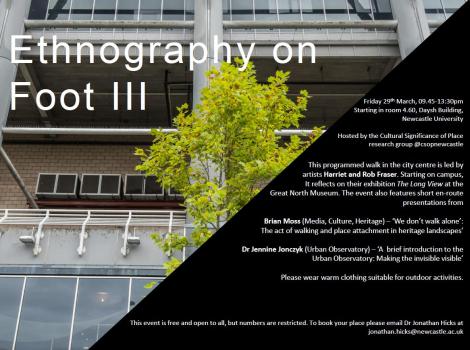 Friday 29th March 2019
Friday 29th March 2019
The programmed walk, led by Harriet and Rob Fraser reflected on their exhibition, The Long View, at the Great North Museum. It will also featured short, en-route contributions from: Brian Moss (Media, Culture, Heritage) and Dr Jennine Jonczyk (Urban Observatory.
Shieling: Building Community spaces
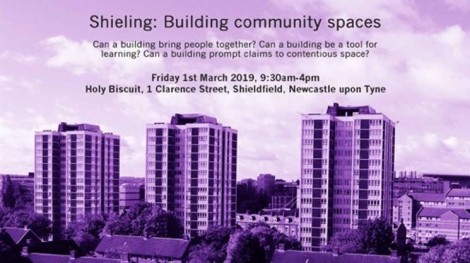 Friday 1st March 2019
Friday 1st March 2019
The neighbourhood of Shieldfield in Newcastle upon Tyne has been privy to rapid urban development – large, generic new-build blocks of student accommodation, affecting the character and social mix of the area, whilst there are also a lack of spaces where existing residents can gather. In response to this context, and as part of an ongoing arts based community project Dwellbeing, Shieling has emerged, not only as a physical space, but also as a symbol, to widen imaginations about the future of Shieldfield.
Shieling, referring to a hut or shelter built on common land and lived in through summer by farming communities, will function as a learning space to be used for community meetings, research events, classes and groups. It seeks to challenge generic forms of urban development, by querying how a building, through its design and materiality can reflect the history and identity of a place and its people, and seeks to propose alternative, co-produced visions of the city through a co-design and co-build process with local residents.
Through the lens of Shieling this event, supported by CSoP, provoked questions about ecological and participatory building typologies; the role that learning can play in co-design/build processes; how production and consumption norms can be challenged through the use of locally abundant and reclaimed materials; how the materiality of a building can reflect place and history; and how physically rooting in place, through the creation of a new building, can prompt community claims to contentious urban space, and open up spaces of commons in the face of enclosure.
The event involved talks by Mairi McFadyen, (The Shieling Project), Luke Devlin, (Centre for Human Ecology) and Julia Heslop (artist and research fellow in Architecture, Newcastle University).
This event was also supported by the Centre for Social Renewal at Newcastle University and the Hilde and Bede Trust.
………………………………………………………………………..
Recording in Place
We were delighted to welcome:
………………………………………………………………………..
Night-time Economies
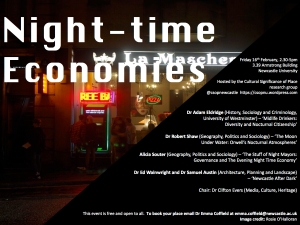
Friday 16th February 2018
We were delighted to welcome:
Dr Adam Eldridge (History, Sociology and Criminology, University of Westminster) – ‘Midlife Drinkers: Diversity and Nocturnal Citizenship’
Dr Robert Shaw (Geography, Politics and Sociology)
Alicia Souter (Geography, Politics and Sociology) – ‘The Stuff of Night Mayors: Governance and The Evening Night Time Economy’.
Dr Ed Wainwright and Dr Samuel Austin (Architecture, Planning and Landscape) – ‘Newcastle After Dark’
Chair: Dr Clifton Evers (Media, Culture, Heritage, Newcastle University)
………………………………………………………………………..
Maps and Mapping II – a roundtable
Friday 8th December 2017
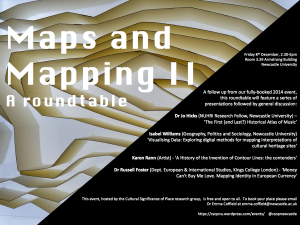
A follow up from our fully-booked 2014 event ‘Maps and Mapping’, this roundtable featured a series of presentations followed by general discussion.
Dr Jo Hicks (NUHRI Research Fellow, Newcastle University) – ‘The First (and Last?) Historical Atlas of Music’
Isabel Williams (Geography, Politics and Sociology, Newcastle University) – ‘Visualising Data: Exploring digital methods for mapping interpretations of cultural heritage sites’
Karen Rann (Artist) – ‘A History of the Invention of Contour Lines: the contenders’
Dr Russell Foster (Dept. European & International Studies, Kings College London) – ‘Money Can’t Buy Me Love. Mapping Identity in European Currency’
Chair: Professor Sam Turner (History, Classics and Archaeology)
The cartographic imagination is clearly not confined to any single discipline. As the speakers at this event will demonstrate, maps and mapping are now used by researchers and creative practitioners of all stripes. Many of us carry maps in our pockets (on phones, on coins) and we are just as likely to ‘map’ social relations or cyber traffic as walking routes or political boundaries. Given this diversity of objects and approaches, it seems timely to ask what questions are common to academics, artists, and archivists in their dealings with visual representations of places? Is it even accurate to describe maps as primarily visual, or has portable technology changed the way that we – as citizens and scholars – interact with our world and the plans we make of it?
More information on Karen’s work can be found at https://thegreatlinesproject.wordpress.com/
………………………………………………………………………..
PGR/ECR Meet & Greet
Wednesday 18th October 2017
Jointly hosted by four Faculty Research Groups (the Cultural Significance of Place Research Group, Gender Research Group, Medieval & Early Modern Studies Research Group and The Digital Cultures Research Group) this event was a chance to meet colleagues with similar interests in different disciplines, to find out more about what the research groups might offer, and how you can join in. Support was on hand for those wanting to develop jointly organised events (the conversations at last year’s event resulted in PGs organising a large international conference, an edited collection, and a journal special issue, all supported by the FRGs).
………………………………………………………………………..
Ethnography on Foot II
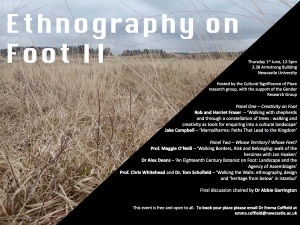
Thursday 1st June 2017
We were delighted to welcome the following:
Panel One – Creativity on Foot
Rob and Harriet Fraser – ‘Walking with shepherds and through a constellation of trees : walking and creativity as tools for enquiring into a cultural landscape’
Jake Campbell (School of English Literature, Language and Linguistics) – ‘Marradharma: Paths That Lead to the Kingdom’
Panel Two – Whose Territory? Whose Feet?
Prof. Maggie O’Neill (University of York) – ‘Walking Borders, Risk and Belonging: walk of the heroines with Jan Haaken’
Dr Alex Deans (University of Glasgow) – ‘An Eighteenth Century Botanist on Foot: Landscape and the Agency of Assemblages’
Prof. Chris Whitehead (Media, Culture, Heritage) and Dr. Tom Schofield (Digital Cultures) – ‘Walking the Walls: ethnography, design and ‘heritage from below’ in Istanbul’
Final discussion – chaired by Dr Abbie Garrington (Durham University)
Chair: Dr Emma Coffield (Media, Culture, Heritage)
This event was been co-convened with the support of the Gender Research Group https://genderresearchgroup.wordpress.com
………………………………………………………………………..
Migration Showcase
To mark the end of 2016/17 migration meetings – and to encourage further work – the Cultural Significance of Place (CSoP) research group held a Migration Showcase.
Featuring over 20 ‘lightning’ presentations from members of staff, students and our colleagues in the field as well as opening remarks from Professor Mark Shucksmith (Director, Newcastle University Institute for Social Renewal) and closing remarks from Sarah Smart (convenor of Newcastle City of Sanctuary)and Abraham Eiluorior, the showcase was an opportunity to demonstrate the range and urgency of migration research at Newcastle, as well as a variety of projects, teaching initiatives and creative responses.
We were delighted to welcome the following:
Prof. Chris Whitehead – Welcome
Prof. Mark Shucksmith – Opening remarks
Panel One
- Dr. Ruth McAreavey – Migration to New Immigration Destinations
- Joey Isaac Jenkins – Rural-Urban Queer Migrations in the Late Twentieth-Century American Novel: The Myth of Metronormativity and the Queerness of Rural Ecology
- Caroline Emily Rae- Establishing New Ecologies: Place, Identity and the Transnational in Fiction of the Northern Atlantic Peripheries
- Prof. Martha Young-Scholten – EU-Speak Project
- Dr. Stacy Gillis – Cultural Explorations of Migration: The Afterlife of Hadrian’s Wall
- Dr. Susannah Eckersley – MeLA: European Museums in an Age of Migrations
- Prof. Chris Whitehead – Thinking Through Migration
- Dr. Susannah Eckersley – Affective Authenticity? Museums, Objects and Memories of Historical and Contemporary Migration
- Dr. Emma Coffield – Spatial Politics in Contemporary Artistic Practice
- James Davoll – Chwarel
Break (Presentations in absentia)
- Dr. Areti Galani – Sit with Me: Research into Migration through Design
- Dr. Sandra Milena Santamaría-Alvarez – Fragmented Networks and Transnational Entrepreneurship: Building Strategies to Succeed in challenging Surroundings
Panel Two
- Dr. Ian Biddle – The Musics of Soviet Jewry, 1928-1952
- Dr. Jonathan Hicks – Cow Calls, Nostalgia, and Musical Displacement
- Madeleine Letherby – Refugee Personhoods
- Maddy Thompson – Geographical Imaginations of Filipino Nurses: Nursing, Migration, and Transnational Influences
- Dr. Robin Finlay – Muslim Youth and Political Participation in Scotland
- Kahina Le Louvier – Cultural Information Needs on the Move: How Can Local Cultural Institutions and Civil Society Organizations Foster Social Inclusion of Migrants, Refugees and Asylum Seekers?
- Dr. Vanessa Mongey – Going Home: Return Migration and the Haitian Diaspora
- Kath Boodhai – If You Lived Here…
- Megan Collier – Home and Belonging on Campus
- Isabel Lima – Broken Chords Can Sing A Little: Episode 2 The Trojan Horse
Closing remarks from Sarah Smart (coordinator Newcastle City of Sanctuary) and Abraham Eiluorior
Presentation of recent projects by Uta Kögelsberger
This event was co-convened by Dr Emma Coffield and Dr Jonathan Hicks with the support of the Newcastle University Institute for Social Renewal (NISR)
………………………………………………………………………..
Oceanic Places
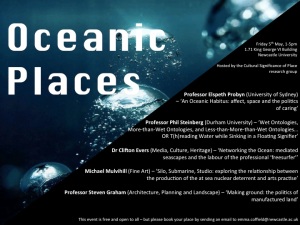
Friday 5th May 2017
We were delighted to welcome the following speakers for this event:
Professor Elspeth Probyn (University of Sydney) – ‘An Oceanic Habitus: affect, space and the politics of caring’
Professor Phil Steinberg (Political Geography, Durham University) – ‘Wet Ontologies, More-than-Wet Ontologies, and Less-than-More-than-Wet Ontologies….OR T(h)reading Water while Sinking in a Floating Signifier’
Dr Clifton Evers (Media, Culture, Heritage) – ‘Networking the Ocean: mediated seascapes and the labour of the professional ‘freesurfer’’
Michael Mulvihill (Fine Art) – ‘Silo, Submarine, Studio: exploring the relationship between the production of the at sea nuclear deterrent and arts practise’
Professor Steven Graham (Architecture, Planning and Landscape) – ‘Making ground: The politics of manufactured land’
Chair: Caroline Rae (School of English Literature, Language and Linguistics)
………………………………………………………………………..
Place, Class and Youth: New Thinking from the UK and Australia
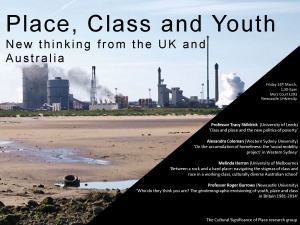 24th March 2017
24th March 2017
We were delighted to welcome the following speakers for this event:
Professor Tracy Shildrick (Sociology and Social Policy, University of Leeds) – ‘Class and place and the new politics of poverty’
Alexandra Coleman (Institute for Culture and Society, Western Sydney University) – ‘On the Accumulation of Homeliness: the ‘Social Mobility Project’ in Western Sydney’
Melinda Herron (The School of Social and Political Sciences, The University of Melbourne) – ‘Between a rock and a hard place: navigating the stigmas of class and race in a working-class, culturally diverse Australian school’
Professor Roger Burrows (School of Architecture, Planning & Landscape, Newcastle University) – ‘Who do they think you are? The Geodemographic Envisioning of Youth, Place and Class in Britain 1981-2014’
Chair: Professor Anoop Nayak (School of Geography, Politics and Sociology, Newcastle University)
………………………………………………………………………..
New Approaches to Masculinities
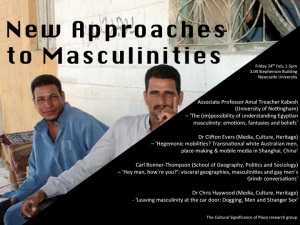
24th February 2017
Featuring new work from researchers in a variety of disciplines, this session explored the tradition and workings of masculinities and gender – and suggested some new approaches for the future. We were delighted to welcome:
Associate Professor Amal Treacher Kabesh (School of Sociology and Social Policy, The University of Nottingham) – ‘The (im)possibility of understanding Egyptian masculinity: emotions, fantasies and beliefs’
Dr Clifton Evers (Media, Culture, Heritage) – ‘Hegemonic mobilities? Transnational white Australian men, place-making & mobile media in Shanghai, China’
Carl Bonner-Thompson (Human Geography) – ‘Hey man, how’re you?’: visceral geographies, masculinities and gay men’s Grindr conversations’
Dr Chris Haywood (Media, Culture, Heritage) – ‘Leaving masculinity at the car door: Dogging, Men and Stranger Sex’
Chair: Dr Raksha Pande (School of Geography, Politics and Sociology)
……………………………………………………………………
Re-thinking Housing and the Home
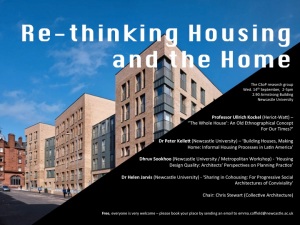
14th September 2016
This session brought together practitioners and researchers from a number of different subject areas to re-think ideas of the home and housing. We were delighted to welcome:
Professor Ullrich Kockel (Heriot-Watt University) – “The Whole House’: An Old Ethnographical Concept for Our Times?’
Dr Peter Kellett (Newcastle University) – ‘Building Houses, Making Home: Informal Housing Processes in Latin America’
Dhruv Sookhoo (Newcastle University / Metropolitan Workshop) – ‘Housing Design Quality: Architects’ Perspectives on Planning Practice’
Professor Rose Gilroy (Newcastle University) – ‘Housing our Future Selves’
Chair: Chris Stewart (Collective Architecture)
………………………………………………………………………..
East European Memory Space
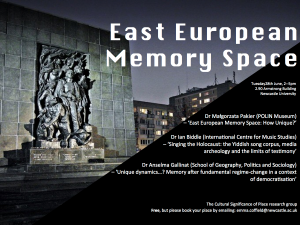
28th June 2016
This event featured a keynote talk from Dr Małgorzata Pakier, of the POLIN Museum of the History of Polish Jews. Titled “East European Memory Space: How Unique?” Dr Pakier’s talk focused on the emerging international field of East European Memory Studies, and the way that Warsaw’s city space commemorates the Jewish past, in order to propose an alternative view on East European memories that includes broader, European and global references. Dr Pakier was joined by:
Dr Ian Biddle (International Centre for Music Studies, Newcastle University) – ‘Singing the Holocaust: the Yiddish song corpus, media archeology and the limits of testimony’
Dr Anselma Gallinat (School of Geography, Politics and Sociology, Newcastle University) – ‘Unique dynamics…? Memory after fundamental regime-change in a context of democratisation’
Chair: Prof Chris Whitehead
More information on the POLIN Museum of the History of Polish Jews can be found here: http://www.polin.pl/en
………………………………………………………………………..
Migration, asylum and participatory research
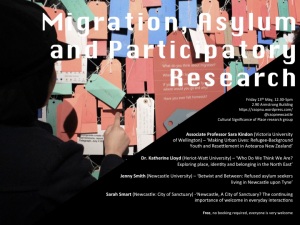
13th May 2016
We were delighted to welcome:
Associate Professor Sara Kindon (Victoria University of Wellington) – ‘Making Urban Lives: Refugee-Background Youth and Resettlement in Aotearoa New Zealand’
Dr. Katherine Lloyd (Heriot-Watt University) – ‘Who Do We Think We Are? Exploring place, identity and belonging in the North East’
Jenny Smith (Newcastle University) – ‘Betwixt and Between: Refused asylum seekers living in Newcastle upon Tyne’
Sarah Smart (Newcastle: City of Sanctuary) -‘Newcastle, A City of Sanctuary? The continuing importance of welcome in everyday interactions’
Chair: Prof. Peter Hopkins
Our keynote speaker for this event, Sara Kindon, is Associate Professor in Human Geography and Development Studies in the School of Geography, Environment and Earth Sciences, Victoria University of Wellington, Aotearoa New Zealand and Visiting Fellow at the School of Geography, Politics and Sociology, Newcastle University.
Sara’s paper, ‘Making Urban Lives: Refugee-Background Youth and Resettlement in Aotearoa New Zealand’ distills key insights about how young former refugees make ‘new’ lives in urban Wellington, New Zealand during resettlement. Drawing on qualitative data from participatory research projects with diverse refugee-background youth since 2005, Sara describes the ways in which young people mindfully negotiate their identities, build a sense of belonging and negotiate discrimination within various neighbourhoods and institutions in the city. Within the context of broader research on resettlement and youth development, she considers the importance of gender, youth connectedness, and resilience for their resettlement outcomes. The findings have implications for current representations of refugee-background young people and how policy and practice may better support their effective resettlement.
………………………………………………………………………..
Emplaced Bodies / Embodied Places
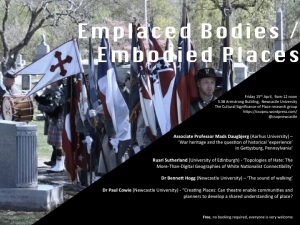
Friday 15th April 2016
In this session, the group considered how we understand place through the body, and the body in, through and between place(s). We were delighted to welcome:
Prof. Chris Whitehead (with thanks to Gönül Bozoğlu) (Newcastle University) – ‘Embodying Histories in Civil Protest’
Ruari Sutherland (University of Edinburgh) – ‘Topologies of Hate: The More-Than-Digital Geographies of White Nationalist Connectibility’
Dr Bennett Hogg (Newcastle University) – ‘The sound of walking’
Dr Paul Cowie (Newcastle University) – ‘Creating Places: Can theatre enable communities and planners to develop a shared understanding of place?’
Chair: Dr Emma Coffield
………………………………………………………………………..
Multiculturalism, Education and Place
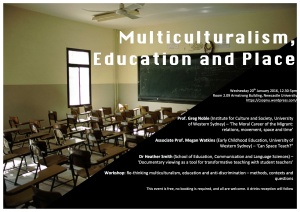 20th January 2016
20th January 2016
What is ‘multiculturalism education’? Who does it, or should it, involve? How might a reassessment of multiculturalism education contribute to debates concerning social justice, spatial politics and migration – and to practice and experience in the classroom? Drawing together researchers and practitioners from varying subject areas, this CSoP event explored the impact of cultural diversity on education. We were delighted to welcome:
Prof. Greg Noble (Institute for Culture and Society, University of Western Sydney) – ‘The Moral Career of the Migrant: relations, movement, space and time’
Associate Prof. Megan Watkins (Institute for Culture and Society, University of Western Sydney) – ‘Can Space Teach?’
Dr Heather Smith (School of Education, Communication and Language Sciences) – ‘Documentary viewing as a tool for transformative teaching with student teachers’
Workshop: Re-thinking multiculturalism, education, and anti-discrimination – methods, contexts and questions
Chair: Dr Clifton Evers
………………………………………………………………………..
Ethnography on Foot: Place, Practice and Documentation
Exploring varying practices that take place ‘on foot’, this event brought together ethnographers, artists and literary critics to discuss moving and movement as a form of knowledge, the politics and territories of landscape, the agency of non-human actors, bodily experience and the challenges posed by documentation. We were delighted to welcome:
Dr. Jo Vergunst (School of Social Science, University of Aberdeen) – ‘Ethnography on foot, and the mobility of trees’
Dr Clifton Evers (Media, Culture, Heritage) – ‘Wet ethnography: Attempts at working with a GoPro™ camera to document the churning together of place, masculinity, and affective life in the sea’
Dr Anthony Schrag (Fine Art / Artist) – ‘A Path Drawn by my Feet From Scotland to Venice: What does 2500 km mean?’
Dr. Abbie Garrington (Lecturer in Modern and Contemporary Literature, Durham University) – ‘The Mallory/Holmes Correspondence: Travelling, Letters, and Travelling Letters’
Chair: Alexia Mellor
………………………………………………………………………..
Responding to the Places and Spaces of Contemporary Art
13th November 2015
From installation art and wall painting, to cultural production, to the ‘placing’ of museums throughout the UK and art as a ‘grounded, practiced, connectedness’ – this first event of the 2015/16 academic year explored the varying ways contemporary art and artists are ‘placed’, and how our characterizations of place, space, landscape and location affect the way we approach and understand art. We were delighted to welcome the following:
Prof. Dave Beech (Valand Academy) – ‘Art and Grounded, Practised, Connectedness’
Neil Davidson (School of Social and Political Sciences, Glasgow University) – ‘Uneven and Combined Development in Cultural Production’
Dr. Emma Coffield (Media, Culture, Heritage, Newcastle University) – ‘Notes Towards the Geographies of Art’
Catrin Huber (Fine Art, Newcastle University) – ‘Fictional Spaces’
Alistair Robinson (Media, Culture, Heritage, Newcastle University and Director of NGCA)- ‘What Does Capital Want?’
Chair: Prof. Sam Turner (History, Classics and Archaeology)
………………………………………………………………………..
The North and Northness: Ideas of Place, Locatedness and Regions
29th May 2015
This final CSoP event in the academic year explored varying constructions and understandings of ‘the North’ – as a physical territory, shared idea, political arena, recognised landscape and body of work – and the role of ‘Northness’ in the evolution of British ideas of place, locatedness and regions. We were delighted to welcome the following:
Professor Penny Fielding (English Literature, University of Edinburgh): ‘Curating the North’
Dr Simon McKerrell (ICMuS, Newcastle University): ‘Musical Metaphors of the North’
Derek Janes (Institute of Maritime Historical Studies, University of Exeter): ‘Can the Concept of ‘Northness’ be applied to Tea Smuggling in the Eighteenth Century?’
Dr Michael Pearce (Department of Culture, University of Sunderland): ‘Anyone from the Northeast who says ‘Mum’ should be shot’
Dr Peter O’Brien (CURDS, Newcastle University): ‘Decentralisation and Devolution in the UK: Where next for the North of England?’
Chair: Prof. Chris Whitehead (International Centre for Cultural and Heritage Studies, Newcastle University).
………………………………………………………………………………
Brave New Worlds: The Dystopia in Modern and Contemporary Fiction
29th – 30th April 2015, Newcastle University
Supported by the Cultural Significance of Place Research Group
Keynote: Professor Andrzej Gasiorek (University of Birmingham)
For the full conference programme, please visit the Brave New Worlds webpage: http://dystopianfictionconference.wordpress.com/
………………………………………………………………………………
The Politics of Mobilities Design: A Research Workshop
15th April 2015,
Organised by Stephen Graham, Geoff Vigar and Ole B. Jensen
The Global Urban Research Unit at Newcastle University, with support from the Cultural Significance of Place Research Group, organised an afternoon workshop with Professor Ole Jensen (Aalborg University) and Dr Eric Laurier (Edinburgh University and Pentti Haddington University of Oulu).
The Politics of Mobilities Design brought together recent research on mobilities technologies affording vertical mobilities (e.g. lifts/elevators, escalators, drones). The workshop explored the interconnectedness of specific design solutions and decisions with the underpinning rationalities of movement and identified mundane mobilities technologies as expressions of a ‘politics of design’. For more information please see the event flyer: The Politics of Mobilities Design Flyer
Professor Ole Jensen also delivered the APL Public Lecture on Thursday 16 April.
………………………………………………………………………………
The Need to Belong: Identity, Solidarity and Resistance in Everyday Life
13th March 2015
This interdisciplinary half-day event explored understandings and theories of belonging, solidarity and exclusion as applied to research concerning historical acts of resistance, contemporary place attachment, the stewardship of place and the struggle to belong and be identified. We were delighted to welcome:
Prof. Montserrat Guibernau (Queen Mary University of London) ‘Belonging: The Necessary Ambiguity of Symbols’
Prof. Tim Kirk (European History, Newcastle University) ‘Industrial Discipline and Everyday Resistance: Nazis and workers in Upper Austria’
Carolyn Gibbeson (International Centre for Cultural and Heritage Studies, Newcastle University) ‘How Can You Belong in an Asylum?’
Dr Sophie Yarker (CURDS, Newcastle University) ‘Stewardship of Place: The Role of Commitment and Contribution for Migrant Sense of Belonging to the Local’
Prof. Peter Hopkins (Social Geography, Newcastle University) ‘Racism, Islamophopbia and Struggles over Belonging’
Chair: Prof. Chris Whitehead (International Centre for Cultural and Heritage Studies, Newcastle University).
………………………………………………………………………………
Tyneside Irish / Irish Migration: Community, Heritage and Co-production
This afternoon event focused on the Irish communities in Tyneside and Irish migration more broadly, with updates from those involved in recent and ongoing projects in the region (Co-Curate North East, Múin Béarla do na Leanbháin), new directions for research and engagement, and a community showcase of heritage resources available to researchers, professionals and other interested parties. We were delighted to welcome:
Dr Jennifer Thorburn and Dr Adam Mearns (School of English Literature, Language & Linguistics): ‘Home away from home: Expressions of identity and belonging’
Dr Michael Richardson (Human Geography): ‘Irish masculinities and intergenerational relations: reflections and new directions’
Dr Katherine Lloyd (International Centre for Culture and Heritage Studies): ‘Co-curating place: community-led research into historical migration and contemporary identity in the North East of England’
More information on the projects can be found here: https://co-curate.ncl.ac.uk/
……………………………………………………………………………..
Non-Places, Digital Worlds and Geographical Imagination: Confronting, Constructing and Valorising Non-Places
12th December 2014
Co-organised by Carolyn Gibbeson (International Centre for Culture and Heritage Studies, Newcastle University)
This interdisciplinary half-day event explored a number of theories and constructions of ‘non-place’, ranging from the abandoned and the lost, to the temporal and digitally mediated, to the nonexistent and the re-imagined. We were delighted to welcome:
Luke Bennett (Sheffield Hallam)’An alley, some old bunkers and a haunted paddock: valorisation, valence and the noticing of non-places’
Prof. Alastair Bonnett (Social Geography, Newcastle University) ‘Non-places and Non-people’
Barti De Sena E Souza (Culture Lab, Newcastle University) ‘Thoughts on installation spaces through the gif cave case’
Dr James Ash (Media and Cultural Studies, Newcastle University) ‘Digital worlds: objects, interfaces, environments’
Dr. Matthew Flintham (Leverhulme Artist-in-Residence) ‘Military-Pastoral Geometries: Revealing the invisible structures of war and defence in the Landscape’
Chair: Dr David Kirk (Culture Lab, Newcastle University)
Luke and Matthew’s excellent blogs can be found here: https://lukebennett13.wordpress.com/ and http://matthewflintham.net
………………………………………………………………………………
Campaigning for Change: Sexual Orientations and Gender Identities
This event asked how, why, and with what impact, sexual orientations and gender identities might be claimed in certain places and spaces, and not others. We were delighted to welcome the following:
Dr Matthew Waites: The New Transnational Politics of LGBT Human Rights: Critical South/North Reorientations
(The University of Glasgow)
Emily Waller and Emily Parkin: The ‘Man Up’ Campaign: Challenging Definitions of Masculinity on Campus
(Newcastle University)
James Cummings: The Intersections of Sexual Identity Politics and Internal Colonialism in Hainan, China
(Newcastle University)
Sarah Smart and Janet Owen: People Who Seek Sanctuary Here
(City of Sanctuary and Rainbow Home)
Anita Madan: A comparative examination of the socio-legal landscape of the rights of the LGBT community in Britain (England and Wales) and Pakistan
(Newcastle University)
Ian McDonald: Partisan sociology & film practice: combating homophobia in sport
(Newcastle University)
Film Screening: ‘Justin’
Chair: Michael Richardson
………………………………………………………………………………
Future Cities
The first ever off-site CSoP event opened with a short talk from Prof. Steven Graham, Vertical dreams: “the ‘layer-cake’ city”, who then led the group on a walking tour of the city. We next went ‘behind the scenes’ at the exhibition and events series, Newcastle City Futures: People, Place Change with exhibition director, Prof Mark Tewdwr-Jones, and heard from Prof. John Gold (Oxford Brookes University), who gave a keynote presentation titled: Nineteen Eighty-Four and all that: imagining future cities 30 years on.
………………………………………………………………………………
Maps and Mapping
This half-day event asked: how do we understand and use maps, and to what ends? Do we need to critically re-think existing mapping practices? Are new ways of representing space and place possible? What have contemporary map-making approaches gained by working across disciplinary boundaries, and what has been lost? The event featured:
Chris Perkins: Rethinking mapping practice: Gozitan encounters
(The University of Manchester)
Dr. Catherine Delano-Smith: Geographies for the Mind, Geographies of the Ground: Thinking about Early Maps
(University of London)
Dr. David Fairbairn: Collecting and representing places: art or science?
(Newcastle University)
Prof. Wolfgang Weileder: Atlas – Photographic recordings of central urban places worldwide
(Newcastle University)
Dr. Russell Foster: Cartographies of Crisis: Mapping the Russian intervention in Crimea
(Newcastle University)
Chair: Prof. Chris Whitehead
………………………………………………………………………………
Interpreting The Past In The Present: Place, Monuments and Boundaries
This half-day event considered how monuments and boundaries constructed in the ancient to recent past continue to be used, negotiated and re-framed in the present, and featured:
Prof. Peter Stone: ‘Ask not what UNESCO can do for you but what you can do for UNESCO. The responsibilities of World Heritage sites in the 21st Century’
(School of Arts and Cultures)
Nick Bridgland: ‘Impartial Persuasiveness – Judging the special interest of Preston Bus Station in the national context’
(Designation Team Leader, English Heritage)
Dr. Susannah Eckersley: ‘Displaced pasts and common ground: Silesian heritage in Germany and Poland’
(International Centre for Culture and Heritage Studies)
Dr. Paul Wright: ‘Architectural longevity and the benevolent act of receiving’
(School of Geography, Politics and Sociology)
Niki Black: ‘Festivals, heritage, boundaries? A consideration of how differing interpretations of heritage impact on cultural festivals’
(International Centre for Cultural and Heritage Studies)
Chair: Dr. Chris Fowler
………………………………………………………………………………
Rapid Networking event: Place and Social Renewal
17th January 2014
Featuring a keynote talk from Prof. Keith Shaw (Northumbria University) and chaired by Professor Mark Tewdwr-Jones (Newcastle University) this event drew together our interdisciplinary membership, and, crucially, provided a space for discussion, paving the way for new actions, understandings and connections.
………………………………………………………………………………
Place and Practice
28th June 2013
Bringing together researchers from diverse subject areas this event considered the use of practice-based research methods, both as a basis for ‘knowing’ or ‘querying’ various places and spaces, and as a form of research ‘output’. It featured:
Dr Harriet Hawkins: ‘“Nuggets”, “Packets”, “Textures” and “Assemblages”: Exploring Creative-Practice-Based Methods for Researching Place’
(Department of Geography, Royal Holloway, University of London)
Annie O’Donnell: ‘Teesside Rococo: Sculpting the Hyperlocal’
(School of Fine Art)
Michael Richardson: ‘To Name or Not to Name: A Performative Response to Caitriona Ni Laoire’
(School of Geography, Politics and Sociology)
Dr. Julie Crawshaw: ‘The Way Art Works: Descriptions of Practice’
(School of Arts and Cultures)
Ruth Barker: ‘Notes on A Love Song’
(School of Fine Art)
Dr. Bennett Hogg: ‘Testing the Water: Improvising with the Physical Affordances of Place
(The International Centre for Music Studies)
Chair: Dr Martyn Husdon
………………………………………………………………………………
Difference, Culture, Conflict and Place
26th April 2013
Exploring how we see, claim, embody, inhabit or think about ‘difference’ in varying spaces and places, and questioning both why it is we persist in the endeavour to articulate ‘difference’ and how we choose to represent and work with those perceived as dissimilar to ourselves, this event featured:
Dr Mitch Rose: ‘Restoring the Question of Culture’
(Department of Geography, Environment and Earth Sciences, University of Hull)
Jenny Lloyd: ‘Embodying Difference: A Study of Expatriate Women in Singapore’
(Geography, Politics and Sociology)
Prof. Anoop Nayak: ‘Inhabiting the Uninhabitable: Chavs, Chavettes and Pram-face Girls, Rethinking Representations of Working-Class Youth’
(Social and Cultural Geography)
Prof. Christopher Whitehead: ‘Dealing with Difference in Museums: Pronouns and Peoples’
(International Centre for Culture and Heritage Studies)
Anthony Schrag: ‘conflict social conflict’
(Fine Art)
Toby Lloyd and Andrew Wilson: ‘Convention, Habit or Custom’
(The NewBridge Project, Newcastle)
Chair: Dr Ann Davies
………………………………………………………………………………
Identity, Belonging, Power and Place
15th March 2013
Bringing together researchers from diverse subject areas, this event investigated notions of ‘place’ in relation to identity construction and expression, narratives of belonging and exclusion, ideas of ‘the local’ and distributions of power and space. The event featured:
Prof. Floya Anthias: ‘Hierarchies of social location and belonging: a translocational framing’
(Emeritus Professor of Sociology and Social Justice, Roehampton University, Visiting Professor, City University)
Sophie Yarker: ‘Being ‘comfortable’ in place: Narratives of local belonging’
(Centre for Urban and Regional Development Studies)
Kat Lloyd: ‘Young people’s narratives of belonging and exclusion in Scotland: place and the shifting boundaries of national identity’
(International Centre of Culture and Heritage Studies)
Dr. Ian Biddle: ‘Between goles and zakhor: music, nationalism and Jewish historiography in Eastern Europe before the Shoah’
(International Centre for Music Studies)
Dr. Stephanie Lawler: ‘Fixed in space and time: representations of the English white working class’
(School of Geography, Politics and Sociology)
Chair: Professor Peter Hopkins

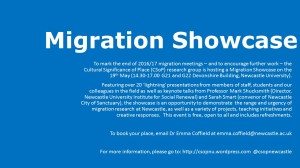
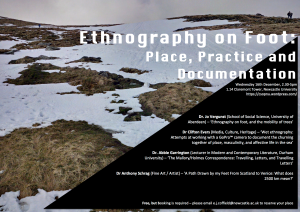
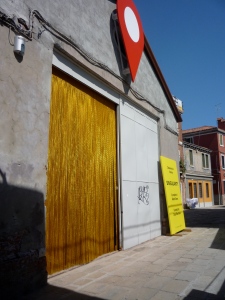
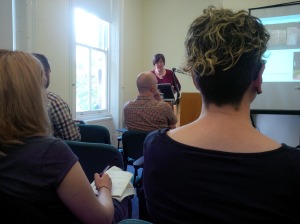
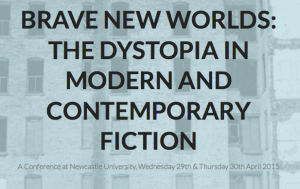
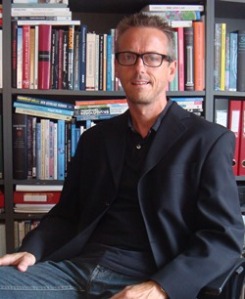
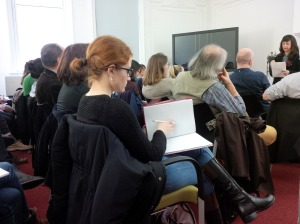
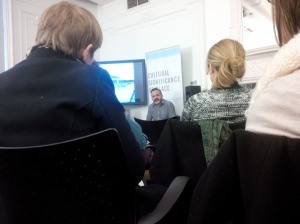
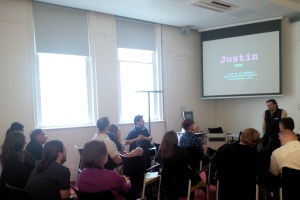
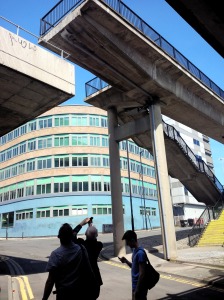
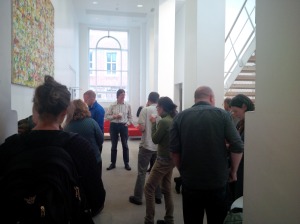
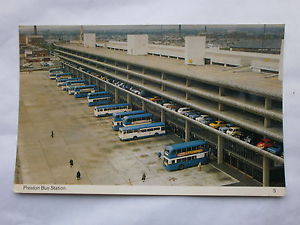
Pingback: Collapsing the sky / closing the building: some thoughts on the unbecoming of places | lukebennett13·